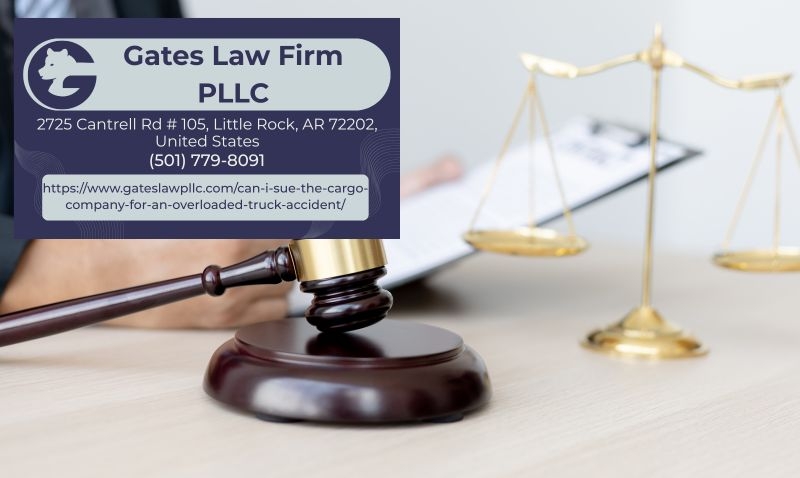Arkansas truck accident lawyer Joseph Gates (https://www.gateslawpllc.com/can-i-sue-the-cargo-company-for-an-overloaded-truck-accident/) of Gates Law Firm PLLC is shedding light on a significant roadway hazard: overloaded trucks and the role cargo companies play in causing severe collisions. A recent article from the firm outlines how cargo loading practices directly impact safety and outlines when legal claims against shippers and loaders may be appropriate.
When an overloaded truck causes a collision, the consequences can be devastating. Arkansas truck accident lawyer Joseph Gates emphasizes that such dangers often originate at the loading dock rather than on the road. “Adding loads beyond the legal weight limit disrupts the balance of carefully engineered safety systems, creating risks that even the most skilled truck driver cannot always control”. These risks, Gates notes, stem from preventable decisions made by cargo handlers and shippers.
Commercial trucking is heavily regulated under both federal and Arkansas law, and overloaded vehicles often violate multiple safety rules. Arkansas truck accident lawyer Joseph Gates explains that any truck exceeding the 80,000-pound gross vehicle weight limit defined under Arkansas Code § 27-35-203 may be considered unlawfully loaded. Such violations can establish legal negligence automatically, strengthening the foundation of a victim’s claim.
Legal responsibility in overloaded truck accidents can extend well beyond the truck driver. Joseph Gates, Arkansas truck accident lawyer and founder of Gates Law Firm PLLC, details how cargo companies, shippers, and loading firms may face direct liability for failing to follow weight regulations and for improperly distributing cargo. According to the article, “These parties have a direct duty to make sure that cargo is safe, properly balanced, and legally compliant before it is placed on the road”.
Arkansas Code § 4-7-301(e) further reinforces cargo company liability, holding shippers accountable for providing accurate weight and cargo descriptions. If incorrect information is provided and results in a truck operating above legal limits, such misrepresentation may serve as powerful evidence in court. Loading companies may also be liable for conduct such as failing to weigh shipments, allowing top-heavy distribution, or pressuring drivers to depart with overweight cargo.
One Arkansas case cited in the article involved a catastrophic crash with an overloaded truck and faulty brakes, resulting in a $3 million settlement. Liability in that case was distributed among the driver, trucking company, and the loading firm. That case illustrates how courts can and do hold cargo companies financially accountable for contributing to collisions.
Legal success in these cases often hinges on fast, strategic evidence gathering. Joseph Gates underscores the importance of preserving internal documents such as weight tickets, loading manifests, and black box data before such records are destroyed under federal retention rules. A formal preservation demand, or spoliation letter, must be sent to each potentially liable party—trucking companies, loaders, and shippers—to prevent loss of evidence.
Documents such as the bill of lading, black box recordings, and driver logs can uncover misrepresentation, show how excess weight affected vehicle performance, and prove mechanical stress on key components. Company emails, dispatch notes, and inspection records also serve as valuable tools in establishing negligence and tracing accountability back to decision-makers at cargo firms or shipping departments.
Arkansas law allows injury victims to seek full compensation when negligence causes harm. Recoverable damages include medical bills, lost wages, property repairs, pain and suffering, emotional distress, and other losses. Punitive damages may also apply in cases where conduct shows clear disregard for public safety, such as knowingly sending overloaded trucks onto the highway.
Comparative fault laws in Arkansas create additional legal complexity. If the victim is found to be 50 percent or more responsible for the crash, no damages can be recovered. Joseph Gates explains that trucking companies often attempt to shift partial blame to reduce payouts, making early legal intervention crucial for protecting the injured party’s claim.
Overloaded truck crashes result in serious, sometimes permanent injuries. Cargo companies, trucking operators, and other third parties may all contribute to these outcomes through regulatory violations and poor decision-making. Arkansas truck accident lawyer Joseph Gates of Gates Law Firm PLLC focuses on holding every responsible party accountable under the law and building strong, evidence-based claims.
Truck crash victims in Arkansas dealing with an overloaded vehicle case deserve legal support grounded in thorough investigation and regulatory knowledge. Joseph Gates and Gates Law Firm PLLC handle these complex claims with attention to detail and a commitment to securing compensation for the full scope of losses endured.
About Gates Law Firm PLLC:
Founded by Joseph Gates in 2020, Gates Law Firm PLLC represents individuals and families across Arkansas affected by serious truck accidents and personal injury cases. Joseph Gates is a member of the Arkansas Trial Lawyers Association, the American Association for Justice, and the Board of Trustees for the Arkansas Bar Association. Gates Law Firm PLLC focuses on client-centered legal strategies designed to secure meaningful results after devastating roadway incidents.
Embeds:
Youtube Video: https://www.youtube.com/watch?v=jrPespwTV7Y
GMB: https://www.google.com/maps?cid=4114337096292287489
Email and website
Email: Gates@GatesLawPLLC.com
Website: https://www.gateslawpllc.com/
Media Contact
Company Name: Gates Law Firm PLLC
Contact Person: Joseph Gates
Email: Send Email
Phone: (501) 779-8091
Address:2725 Cantrell Rd # 105
City: Little Rock
State: Arkansas 72202
Country: United States
Website: https://www.gateslawpllc.com/

